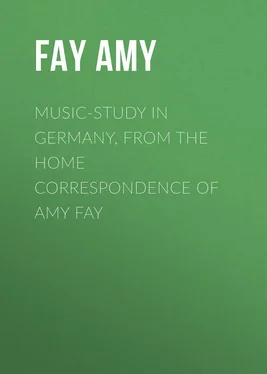Amy Fay - Music-Study in Germany, from the Home Correspondence of Amy Fay
Здесь есть возможность читать онлайн «Amy Fay - Music-Study in Germany, from the Home Correspondence of Amy Fay» — ознакомительный отрывок электронной книги совершенно бесплатно, а после прочтения отрывка купить полную версию. В некоторых случаях можно слушать аудио, скачать через торрент в формате fb2 и присутствует краткое содержание. Жанр: foreign_antique, foreign_prose, на английском языке. Описание произведения, (предисловие) а так же отзывы посетителей доступны на портале библиотеки ЛибКат.
- Название:Music-Study in Germany, from the Home Correspondence of Amy Fay
- Автор:
- Жанр:
- Год:неизвестен
- ISBN:нет данных
- Рейтинг книги:4 / 5. Голосов: 1
-
Избранное:Добавить в избранное
- Отзывы:
-
Ваша оценка:
- 80
- 1
- 2
- 3
- 4
- 5
Music-Study in Germany, from the Home Correspondence of Amy Fay: краткое содержание, описание и аннотация
Предлагаем к чтению аннотацию, описание, краткое содержание или предисловие (зависит от того, что написал сам автор книги «Music-Study in Germany, from the Home Correspondence of Amy Fay»). Если вы не нашли необходимую информацию о книге — напишите в комментариях, мы постараемся отыскать её.
Music-Study in Germany, from the Home Correspondence of Amy Fay — читать онлайн ознакомительный отрывок
Ниже представлен текст книги, разбитый по страницам. Система сохранения места последней прочитанной страницы, позволяет с удобством читать онлайн бесплатно книгу «Music-Study in Germany, from the Home Correspondence of Amy Fay», без необходимости каждый раз заново искать на чём Вы остановились. Поставьте закладку, и сможете в любой момент перейти на страницу, на которой закончили чтение.
Интервал:
Закладка:
Tausig is so hasty and impatient that to be in his classes must be a fearful ordeal. He will not bear the slightest fault. The last time I went into his class to hear him teach he was dreadful. Fräulein H. began, and she has remarkable talent, and is far beyond me. She would not play piano enough to suit him, and finally he stamped his foot at her, snatched her hand from the piano, and said: " Will you play piano or not, for if not we will go no farther?" The second girl sat down and played a few lines. He made her begin over again several times, and finally came up and took her music away and slapped it down on the piano, – "You have been studying this for weeks and you can't play a note of it; practice it for a month and then you can bring it to me again," he said.
The third was Fräulein Timanoff, who is a little genius, I think. She brought a Sonata by Schubert – the lovely one in A minor – and by the way he behaved Tausig must have a particular feeling about that particular Sonata. Timanoff began running it off in her usual nimble style, having practiced it evidently every minute of the time when she was not asleep, since the last lesson. She had not proceeded far down the first page when he stopped her, and began to fuss over the expression. She began again, but this time with no better luck. A third time, but still he was dissatisfied, though he suffered her to go on a little farther. He kept stopping her every moment in the most tantalizing and exasperating manner. If it had been I, I should have cried, but Timanoff is well broken, and only flushed deeply to the very tips of her small ears. From an apple blossom she changed to a carnation. Tausig grew more and more savage, and made her skip whole pages in his impatience. "Play here!" he would say, in the most imperative tone, pointing to a half or whole page farther on. "This I cannot hear! – Go on farther! – It is too bad to be listened to!" Finally, he struck the music with the back of his hand, and exclaimed, in a despairing way, " Kind, es liegt eine Seele darin. Weiss du nicht es liegt eine SEELE darin ? (Child, there's a soul in the piece. Don't you know there is a soul in it?)" To the little Timanoff, who has no soul, and who is not sufficiently experienced to counterfeit one, this speech evidently conveyed no particular idea. She ran on as glibly as ever till Tausig could endure no more, and shut up the music. I was much disappointed, as it was new to me, and I like to hear Timanoff's little fingers tinkle over the keys, "Seele" or no "Seele." She has a most accurate and dainty way of doing everything, and somehow, in her healthy little brain I hardly wish for Seele !
Last of all Fräulein L. played, and she alone suited Tausig. She is a Swede, and is the best scholar he has, but she has such frightfully ugly hands, and holds them so terribly, that when I look at her I cannot enjoy her playing. Tausig always praises her very much, and she is tremendously ambitious.
Tausig has a charming face, full of expression and very sensitive. He is extremely sharp-sighted, and has eyes in the back of his head, I believe. He is far too small and too despotic to be fascinating, however, though he has a sort of captivating way with him when he is in a good humor.
I was dreadfully sorry to hear of poor Gottschalk's death. He had a golden touch, and equal to any in the world, I think. But what a romantic way to die! – to fall senseless at his instrument, while he was playing " La Morte ." It was very strange. If anything more is in the papers about him you must send it to me, for the infatuation that I and 99,999 other American girls once felt for him, still lingers in my breast!
On Saturday night I went for the first time to hear the Berlin Symphony Kapelle. It is composed only of artists, and is the most splendid music imaginable. De Ahna, for instance, is one of the violinists, and he is not far behind Joachim. We have no conception of such an orchestra in America. 1 1 This was written before the full development of the Thomas Orchestra. The writer had heard it only in its infancy.
The Philharmonic of New York approaches it, but is still a long way off. This orchestra is so perfect, and plays with such precision, that you can't realize that there are any performers at all. It is just a great wave of sound that rolls over you as smooth as glass. As the concert halls are much smaller here, the music is much louder, and every man not only plays piano and forte where it is marked, but he draws the tone out of his violin. They have the greatest pathos, consequently, in the soft parts, and overwhelming power in the loud. Where great expression is required the conductor almost ceases to beat time, and it seems as if the performers took it ad libitum ; but they understand each other so well that they play like one man. It is too ecstatic! I observed the greatest difference in the horn playing. Instead of coming in in a monotonous sort of way as it does at home, and always with the same degree of loudness, here, when it is solo, it begins round and smooth and full, and then gently modulates until the tone seems to sigh itself out, dying away at last with a little tremolo that is perfectly melting. I never before heard such an effect. When the trumpets come in it is like the crack of doom, and you should hear the way they play the drums. I never was satisfied with the way they strike the drums in New York and Boston, for it always seemed as if they thought the parchment would break. Here, sometimes they give such a sharp stroke that it startles me, though, of course, it is not often. But it adds immensely to the accent, and makes your heart beat, I can tell you. They played Schubert's great symphony, and Beethoven's in B major, and I could scarcely believe my own ears at the difference between this orchestra and ours. It is as great as between – and Tausig.
Tausig is off to Russia to-day on a concert tour, and will not return until the 1st of May. Out of six months he has been in Berlin about two and a half! However, as I am not yet in his class it doesn't affect me much, but I should think his scholars would be provoked at such long absences. That is the worst of having such a great artist for a master. I believe we are to have no vacation in the summer though, and that he has promised to remain here from May until November without going off. Ehlert and Tausig have had a grand quarrel, and Ehlert is going to leave the conservatory in April. I am very sorry, for he is an admirable teacher, and I like him extremely.
We had another Musical Reading on Sunday, at which I played, but all the conservatory classes were there, and all the teachers, with Tausig, also, so it was a pretty hard ordeal. The girls said I turned deadly pale when I sat down to the piano, and well I might, for here you cannot play any thing that the scholars have not either played themselves or are perfectly familiar with, so they criticise you without mercy. Tausig plays so magnificently that you know beforehand that a thing can never be more than comparatively good in his eyes. Fräulein L. is the only one of his pupils that plays to suit him. I do not like her playing so much myself, because it sounds as if she had tried to imitate him exactly – which she probably does. It does not seem spontaneous, and she is an affected creature. They all think 'the world' of her at the conservatory, and I suppose she is quite extraordinary; but I prefer Fräulein Timanoff – " die kleine Person ," as Tausig calls her – and she is, indeed, a "little person." On Sunday Fräulein L. played the first part of a Sonata by Chopin, and Tausig was quite enchanted with her performance. I thought he was going to embrace her, he jumped up so impetuously and ran over to her. He declared that it could not be better played, and said he would not hear anything else after that, and so the school was dismissed, although several had not played that expected to do so.
Читать дальшеИнтервал:
Закладка:
Похожие книги на «Music-Study in Germany, from the Home Correspondence of Amy Fay»
Представляем Вашему вниманию похожие книги на «Music-Study in Germany, from the Home Correspondence of Amy Fay» списком для выбора. Мы отобрали схожую по названию и смыслу литературу в надежде предоставить читателям больше вариантов отыскать новые, интересные, ещё непрочитанные произведения.
Обсуждение, отзывы о книге «Music-Study in Germany, from the Home Correspondence of Amy Fay» и просто собственные мнения читателей. Оставьте ваши комментарии, напишите, что Вы думаете о произведении, его смысле или главных героях. Укажите что конкретно понравилось, а что нет, и почему Вы так считаете.












